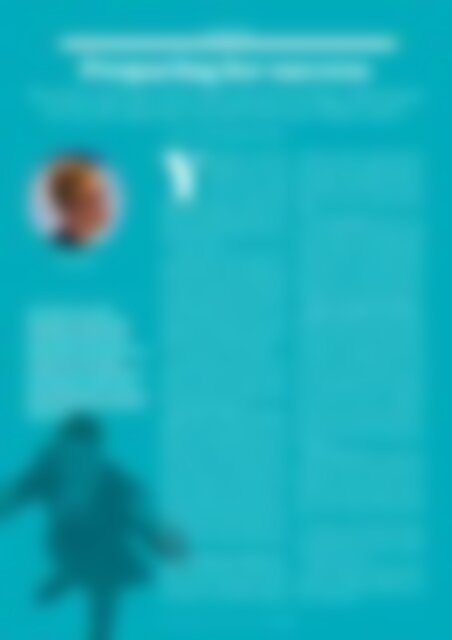Credit Management March 2018
The CICM magazine for consumer and commercial credit professionals
The CICM magazine for consumer and commercial credit professionals
You also want an ePaper? Increase the reach of your titles
YUMPU automatically turns print PDFs into web optimized ePapers that Google loves.
OPINION<br />
Preparing for success<br />
The first interview went well and you’ve been called back<br />
for the all-important second interview. What’s next?<br />
AUTHOR – Karen Young, Director at Hays<br />
Karen Young<br />
The objectives of the<br />
interviewer at this stage<br />
will differ from the first<br />
time round as they delve<br />
further into your motivation<br />
for the job, your skills,<br />
whether you’re a good fit for<br />
the company culture and<br />
addressing any reservations<br />
they may hold from the first<br />
interview.<br />
YOU’VE made a good first<br />
impression at the first<br />
interview and have been<br />
asked back for a second<br />
interview. The company<br />
is now seriously considering<br />
hiring you and as a result you’ll be<br />
feeling more confident as you take a step<br />
closer to securing the job. However, you<br />
may still be wondering what to expect as a<br />
second interview can differ from the first<br />
in a number of ways.<br />
A more senior figure will most likely<br />
be conducting the second interview depending<br />
on the size of the company. Confirm<br />
this with your recruiter beforehand<br />
so you can do some research into the person,<br />
either on LinkedIn or via the company<br />
website. Check the format of the interview<br />
beforehand as well, you don’t want to<br />
find yourself preparing for a one-on-one<br />
interview to then be faced with a panel of<br />
stakeholders or delivering a presentation.<br />
You’ll feel more confident knowing who<br />
will be on the other side of the table.<br />
The objectives of the interviewer at<br />
this stage will differ from the first time<br />
round as they delve further into your motivation<br />
for the job, your skills, whether<br />
you’re a good fit for the company culture<br />
and addressing any reservations they may<br />
hold from the first interview.<br />
Your level of interest in the opportunity:<br />
People are often turned down at<br />
interview because employers just don’t<br />
believe they are highly motivated or want<br />
the job enough. Don’t underestimate the<br />
effectiveness of vocalising your interest.<br />
The interviewer will be looking to determine<br />
whether you’re still interested in<br />
the opportunity after having learnt more<br />
about the company and role in the initial<br />
interview stages and through your research.<br />
Speak about what you found interesting<br />
from the first interview and use the<br />
opportunity to ask any questions you may<br />
have. This will give the interviewer an indication<br />
of how well you would perform if<br />
offered the job, so make sure this comes<br />
across.<br />
Communicating your skills and experience:<br />
The interviewer will want to explore<br />
your skills further and hear detailed<br />
evidence of your competencies. ‘Describe<br />
a time you have used effective management<br />
skills’ or ‘how would you approach<br />
a difficult situation’ are likely questions<br />
at this stage. <strong>Credit</strong> management professionals<br />
often need to explain complex financial<br />
topics to colleagues who may not<br />
be as familiar with the world of credit or<br />
finance, so be sure to answer questions<br />
clearly and succinctly to demonstrate this<br />
ability.<br />
Are you the right ‘fit’? They will also<br />
want to establish whether you’ll be a good<br />
fit for the culture of the organisation and<br />
you may be taken around the office to meet<br />
potential colleagues. Be yourself throughout<br />
this exercise, as assessing cultural fit<br />
is essential for you to be confident it is the<br />
right role for you. With this in mind, perhaps<br />
prepare your own questions such as<br />
asking what the team is like, or what your<br />
interviewer enjoys about working there.<br />
Address any doubts the interviewer<br />
may have: It’s possible that the interviewer<br />
may be holding some reservations from<br />
the first interview that they’ll be looking<br />
to address in the second. Recall any questions<br />
that you were asked multiple times,<br />
or anything you struggled to answer and<br />
ask your recruiter for feedback to help<br />
you address these second-time round. If<br />
there are any gaps between your skills and<br />
the job requirements consider addressing<br />
these with your recruiter, or commit to<br />
learning them in the future. Emphasise<br />
that you’re a fast learner and are keen to<br />
develop yourself, showing the interviewer<br />
that you’ll be worth any investment the organisation<br />
will put into your training and<br />
development.<br />
Salary expectations: Salary and notice<br />
period are often a topic of conversation<br />
at this stage. Have this information ready<br />
beforehand. If you’re unsure of how to<br />
negotiate your salary discuss with your recruiter<br />
or consult a tool such as our online<br />
salary checker which can help you understand<br />
what your potential earnings could<br />
be.<br />
Remember, good lasting impressions<br />
count. Thank your interviewer for their<br />
time and contact your recruiter as quickly<br />
as possible after the interview to reiterate<br />
your interest in the role.<br />
Understanding the purpose of second<br />
interviews can help you to improve your<br />
preparation strategy and show an interviewer<br />
exactly why they should hire you<br />
above everyone else.<br />
The Recognised Standard / www.cicm.com / <strong>March</strong> <strong>2018</strong> / PAGE 72


















